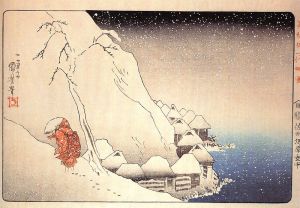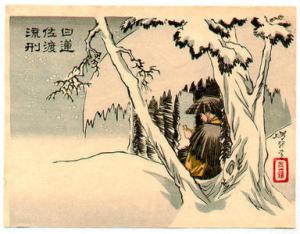Nichiren in Japanese Art: Exile to Sado Island of Buddhist Holy Man in Art
Lee Jay Walker
Modern Tokyo Times
Nichiren (1222-1282) was born during a very unstable period in Japan because of internal political convulsions, the devastation of nature, and belief that the world was entering a bleak period based on growing backwardness. Debates took place around the Latter Day of the Law and according to Nichiren this sad reality was based on the false Buddhist schools of his time. Therefore, the thirteenth century in Japan had feelings of foreboding and questioning the status quo.
According to Nichiren, it was best to suffer pain and sorrow rather than abuse the settings of power and influence based on false teaching. He said, “It is better to be a leper who chants Nam-myōhō-renge-kyō than be a chief abbot of the Tendai school.”
Buddhists who follow the teachings of Nichiren believe in ten basic principles that are instrumental to human nature. It isn’t important to stress all these principles but instead relate several tenets to the harsh exile of Nichiren to Sado Island.
Of major significance is the negative reality of animal nature based on people preying on individuals who are weaker. On a higher level, political control, war, abuse of power at various levels, and other areas related to power concentration and control. Therefore, the second exile of Nichiren, just like the failed execution of this Buddhist holy man, was based on this sinister reality.
Utagawa Kuniyoshi (1797-1861) depicts beautifully the exile of Nichiren on Sado Island. In this image, Nichiren is going into exile to the backdrop of harsh wintery conditions and a sense of isolation. Yet despite the gloomy outlook, Nichiren is not looking back but moving forward. This reality would also apply to his knowledge, wisdom, and moving towards Buddhahood.
The traits above all equally apply to the basic principles laid down within the Nichiren tenets, in relation to absorption, learning, tranquility, and Buddhahood. Indeed, the second art piece highlighted by Tsukioka Yoshitoshi (1839-1892) shows Nichiren in deep contemplation. In this image, he hungers for nothing despite the harshness of his reality and this is the beauty of this Buddhist holy man.
Overall, many amazing attributes and mysteries apply to Nichiren. After all, he escaped a brutal execution where so many others fell before him. This reality is based on the realms of nature but hidden within the mystery of life. Similarly, Nichiren predicted the Mongol invasion and challenged all and sundry where others would fear.
Modern Tokyo News is part of the Modern Tokyo Times group
DONATIONS to SUPPORT MODERN TOKYO TIMES – please pay PayPal and DONATE to sawakoart@gmail.com
http://moderntokyotimes.com Modern Tokyo Times – International News and Japan News
http://sawandjay.com Modern Tokyo Times – Fashion
https://moderntokyonews.com Modern Tokyo News – Tokyo News and International News
http://global-security-news.com Global Security News – Geopolitics and Terrorism
PLEASE JOIN ON TWITTER
https://twitter.com/MTT_News Modern Tokyo Times
PLEASE JOIN ON FACEBOOK


